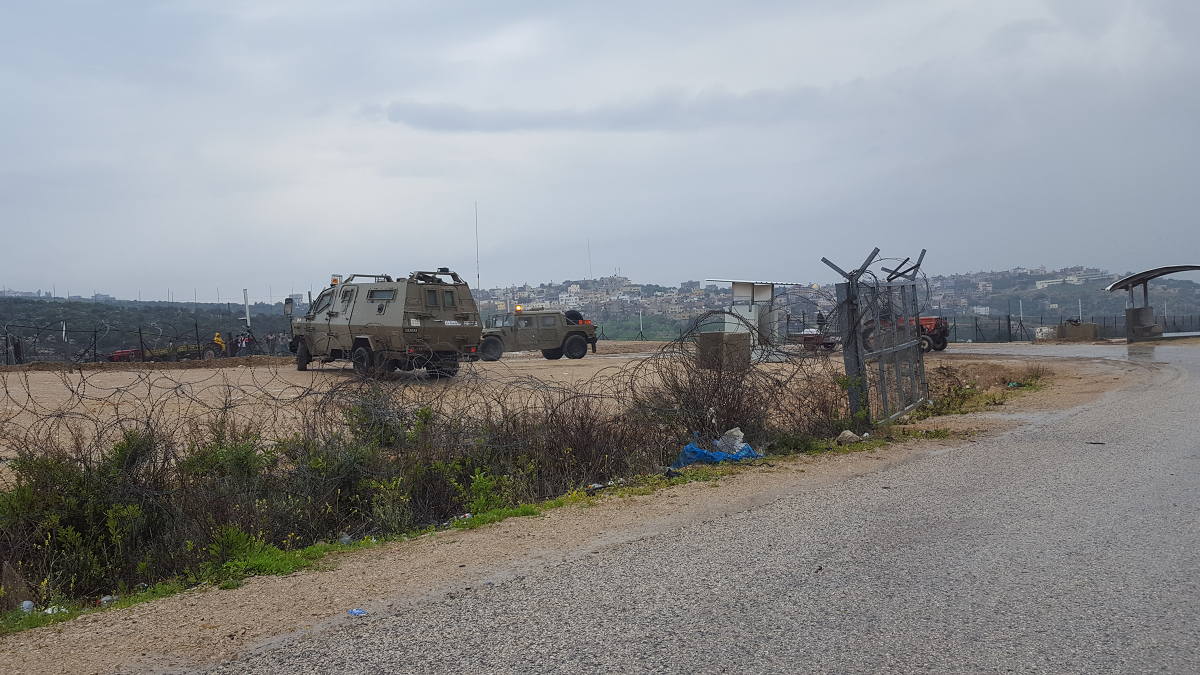'Anin, Barta'a-Reihan, Tayba-Rummana, Tura-Shaked
Rain escorts us and delights the farmers

photo Shuli Bar Anin c.p 16/3/2017
Barta’a Reihan Checkpoint 05:50
Morning riot at the checkpoint, see video here
Judging from the state of the huge waiting line at the entrance to the terminal on its West Bank side, we understand that once again, this morning, the Israeli security firm is not working at full capacity. Thousands of Palestinians cross here to their work places, constructing the new town of Harish. It’s not as though every day thousands congregate. On some days everything flows, and on others like today, the delay that beings at the entrance by the turnstile – which opens with long intervals – and then at the entrance to the terminal at the x-ray machines. Apparently the checking posts are also under-manned. Consequently people are angry, quarrel over their place in line, stressed about being late for work. “They do this to us on purpose”, they say, and there’s talk of a strike next week if things don’t improve. The Palestinian security personnel, dressed in black from head to toe, try to control the situation but are actually ineffective. They wave their black electric shocker and black club and yell and plead – “one by one…” But no one really minds them. A young man tells us that his brother, whose hand is disabled, has a hard time crossing the checkpoint on his own and undoing and redoing his belt in the crush of the waiting line to the terminal. We promised to inquire with the checkpoint staff if they would let him cross through the vehicle lane.
Anin Agricultural Checkpoint 06:30
There are about 70 agricultural checkpoint along the Separation Barrier (fence or wall), enabling limited passage to the Seamline Zone for a limited number of farmers who wish and need to continue cultivating the lands that have been robbed from them and from which they have been separated (hence – “seamline” zone, with villages and its inhabitants to the east of the Barrier and their agricultural lands to its west, between the Barrier and the Green Line). At this agricultural checkpoint, beside those holding farmers’ permits, there are also those who possess work and trade permits. The elderly who cross without permits saunter off happily to visit relatives nearby. The rain makes everyone happy. We keep being asked whether we’re happy. Are you? We ask him. Yes, thank God, definitely. Well, then so are we… Less people crossed this time, probably because of the rain. So many Palestinians would love to cross but are denied passage because of the strict permit retime.
A farmer on a tractor with cart. In the cart travels his young son. No School? We ask with concern. Yes, he says, but the child cried – he only wants to be with his dad.
Toura Shaked “fiber of life” checkpoint 07:00
On the western/Israeli side of the Separation Fence lies the Seamline Zone, enclosing farm lands that have been separated from their farmer owners of the West Bank, as well as locking in 7500 Palestinians whom the Fence has separated from the West Bank. Both categories need permits, that are not at all easily issued, in order to maintain what the army poetically names “fiber of life”, thus admitting that the Separation Barrier unravels the lives of Palestinians. Toura is one of those “fiber of life” checkpoints.
As we arrive at the official opening time, the soldiers are not there. The checkpoint is empty, closed, locked. They will come at their leisure, take their time getting organized, and the first Palestinian to appear from the West Bank will be 20 minutes late, at 07:20. The schoolchildren from the Seamline Zone cross first to their school in the Palestinian village of Toura, without inspections.
Tayibe Roumana Checkpoint 08:00
The soldiers are already here. The gates opened just as we arrived. Less people than usual came through, including a grandmother, her two daughters-in-law and two tiny grandchildren. We held a jolly women’s conversation in our broken Arabic, and for a moment things looked up.
opened just as we arrived. Less people than usual came through, including a grandmother, her two daughters-in-law and two tiny grandchildren. We held a jolly women’s conversation in our broken Arabic, and for a moment things looked up.
